Mindfulness practices can significantly enhance focus and reduce stress, making them essential tools for mental well-being. Techniques like meditation, deep breathing, and body scanning improve attention span and cognitive flexibility. Culturally diverse methods offer unique approaches to mindfulness, while tailored practices for different age groups maximize benefits. Overcoming common challenges in starting mindfulness can lead to sustained improvements in mental clarity and emotional regulation.
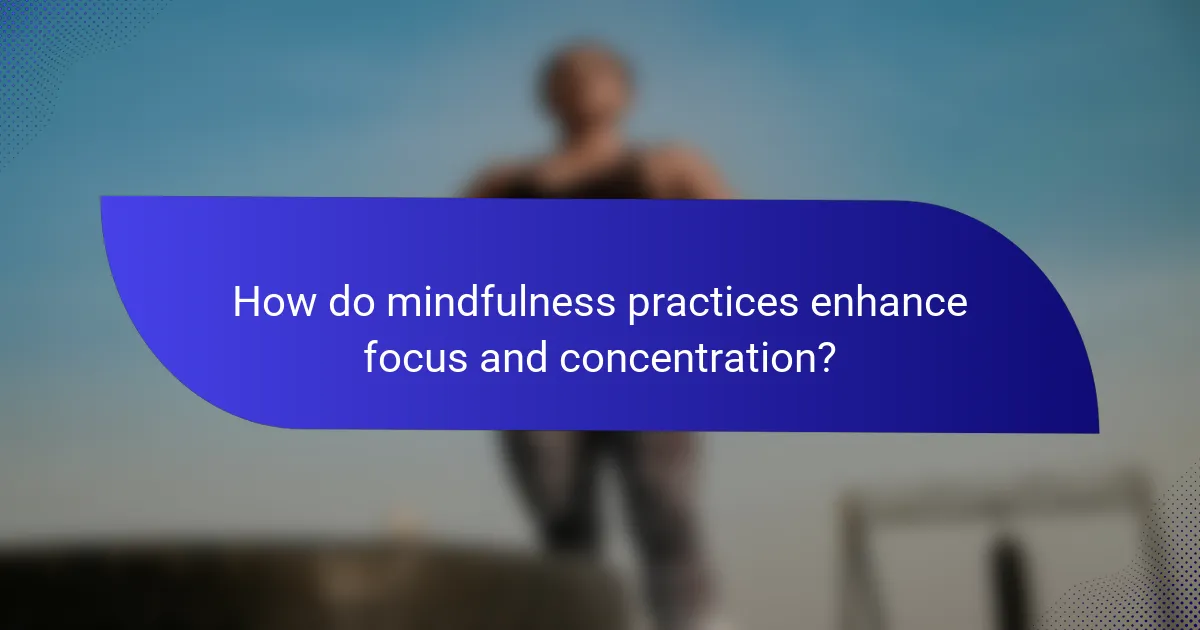
How do mindfulness practices enhance focus and concentration?
Mindfulness practices significantly enhance focus and concentration by training the mind to remain present. Techniques such as meditation, deep breathing, and body scanning reduce distractions and promote mental clarity. Research indicates that regular mindfulness practice can improve attention span and cognitive flexibility. For instance, a study found that participants who engaged in mindfulness exercises showed a 16% increase in attention metrics compared to those who did not. By reducing stress, mindfulness also creates a conducive environment for improved focus, enabling individuals to perform better in tasks requiring sustained attention.
What specific techniques are most effective for improving attention?
Mindfulness practices such as meditation, deep breathing, and body scans effectively enhance attention and reduce stress. These techniques foster present-moment awareness, improving cognitive control. For example, studies show that regular mindfulness meditation can increase focus by up to 16%.
How does mindfulness training impact cognitive performance?
Mindfulness training significantly enhances cognitive performance by improving focus and reducing stress. Regular practice fosters better attention control, enhances working memory, and promotes emotional regulation. Studies indicate that mindfulness can lead to a 20% increase in attention span and a notable reduction in anxiety levels, which directly correlates with improved cognitive functioning. Additionally, mindfulness practices encourage neuroplasticity, allowing the brain to adapt and optimize its performance over time.
Which mindfulness exercises can be integrated into daily routines?
Mindfulness exercises can easily fit into daily routines to enhance focus and reduce stress. Incorporating practices like deep breathing, body scans, and mindful walking can be effective.
1. Deep Breathing: Spend five minutes focusing on your breath, inhaling deeply and exhaling slowly.
2. Body Scan: Dedicate ten minutes to mentally scan your body from head to toe, noticing areas of tension.
3. Mindful Walking: Take a short walk while concentrating on each step and the sensations of your surroundings.
4. Gratitude Journaling: Write down three things you are grateful for each day to foster a positive mindset.
5. Guided Meditation: Use a meditation app for a quick session during breaks to reset your focus.
6. Mindful Eating: Take time to savor each bite during meals, paying attention to flavors and textures.
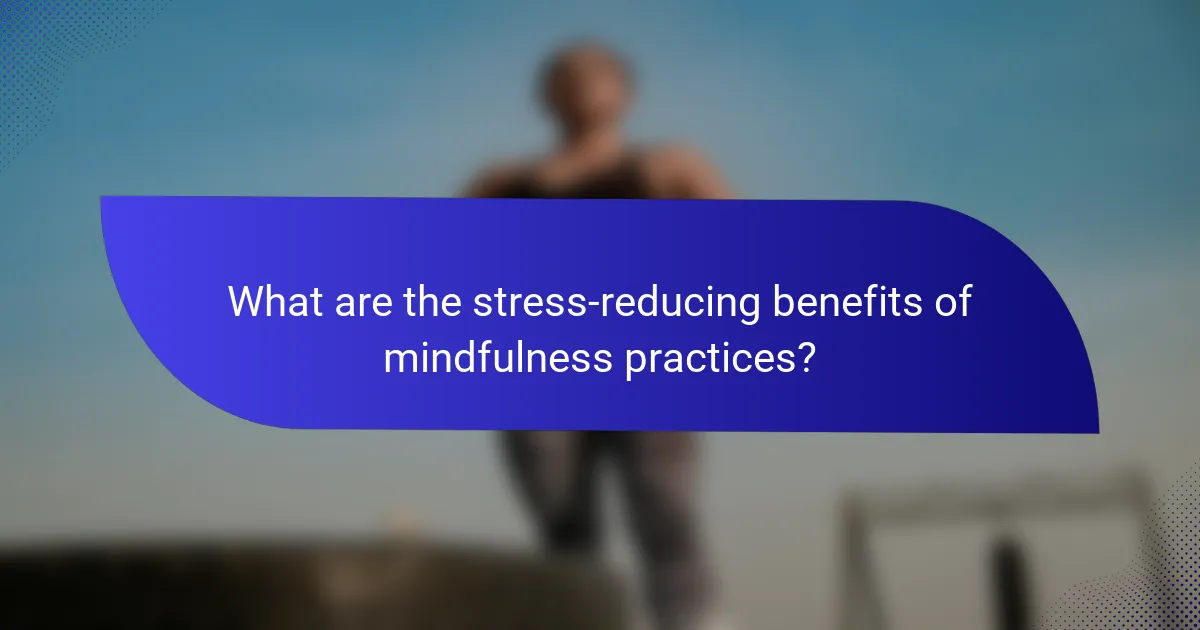
What are the stress-reducing benefits of mindfulness practices?
Mindfulness practices significantly reduce stress by enhancing focus and promoting relaxation. Techniques such as meditation, deep breathing, and mindful movement lower cortisol levels, improve emotional regulation, and foster a sense of calm. Research indicates that regular mindfulness practice can decrease anxiety and improve overall mental well-being. Additionally, mindfulness enhances awareness of thoughts and feelings, allowing individuals to respond to stressors more effectively.
How does mindfulness help in managing anxiety and stress levels?
Mindfulness significantly reduces anxiety and stress levels by enhancing focus and promoting relaxation. Mindfulness practices, such as meditation and deep breathing, help individuals become aware of their thoughts and feelings without judgment. This awareness allows for better emotional regulation and reduces the impact of stressors. Research indicates that regular mindfulness practice can lead to a 30% reduction in anxiety symptoms. Additionally, mindfulness fosters resilience by encouraging a present-focused mindset, which can mitigate the effects of overwhelming thoughts and feelings.
What role does mindfulness play in emotional regulation?
Mindfulness significantly enhances emotional regulation by promoting awareness and acceptance of feelings. It allows individuals to observe their emotions without judgment, leading to improved focus and reduced stress. Mindfulness practices, such as meditation and deep breathing, foster a calm state of mind, enabling better responses to emotional triggers. Research indicates that regular mindfulness practice can decrease emotional reactivity and increase resilience, ultimately supporting healthier emotional management.
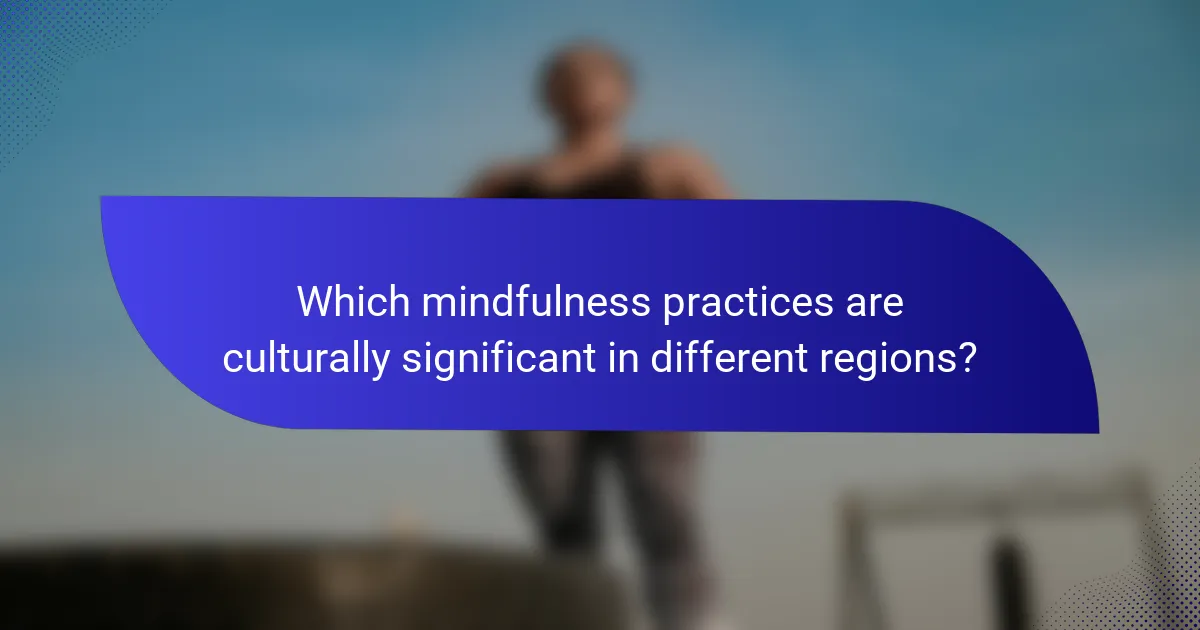
Which mindfulness practices are culturally significant in different regions?
Mindfulness practices vary significantly across cultures, each offering unique methods for improving focus and reducing stress.
In Asia, Zen meditation emphasizes present-moment awareness and breath control, fostering mental clarity. In India, yoga combines physical postures with breath regulation, enhancing concentration and relaxation.
Western cultures often adopt mindfulness-based stress reduction (MBSR), which incorporates meditation and body awareness techniques to alleviate stress and improve focus.
Indigenous practices, such as sweat lodge ceremonies, promote communal mindfulness and spiritual connection, providing holistic stress relief. Each practice reflects its cultural roots while contributing to mental well-being.
How do mindfulness approaches vary across North America and Europe?
Mindfulness approaches in North America and Europe differ in techniques and cultural integration. North American practices often emphasize individualism and therapeutic benefits, focusing on stress reduction and productivity enhancement. In contrast, European mindfulness tends to incorporate community aspects, emphasizing connection and presence within social contexts.
For example, North America frequently utilizes mindfulness in corporate settings, promoting focus through structured programs. European practices may include group activities, fostering collective mindfulness experiences. Both regions value mindfulness for its ability to improve focus and reduce stress, but the methods and contexts vary significantly.
Research indicates that 70% of North Americans engage in mindfulness to manage stress, while in Europe, 65% report using it for emotional well-being. This highlights distinct motivations driving mindfulness adoption across these regions.
What unique mindfulness traditions exist in various cultures?
Various cultures have unique mindfulness traditions that enhance focus and reduce stress. These practices often incorporate specific techniques and philosophies rooted in their historical contexts.
Zen Buddhism emphasizes zazen, or seated meditation, focusing on breath awareness to cultivate present-moment attention. This practice fosters mental clarity and emotional stability.
In India, mindfulness is integrated into yoga, where asanas (postures) and pranayama (breath control) are combined to promote holistic well-being. This approach enhances physical and mental focus.
Tibetan Buddhism features mindfulness in the practice of Tonglen, which involves breathing in the suffering of others and breathing out compassion. This unique practice encourages empathy and emotional resilience.
Indigenous cultures often practice mindfulness through rituals and connection with nature. These traditions emphasize being present in the natural world, fostering a deep sense of peace and grounding.
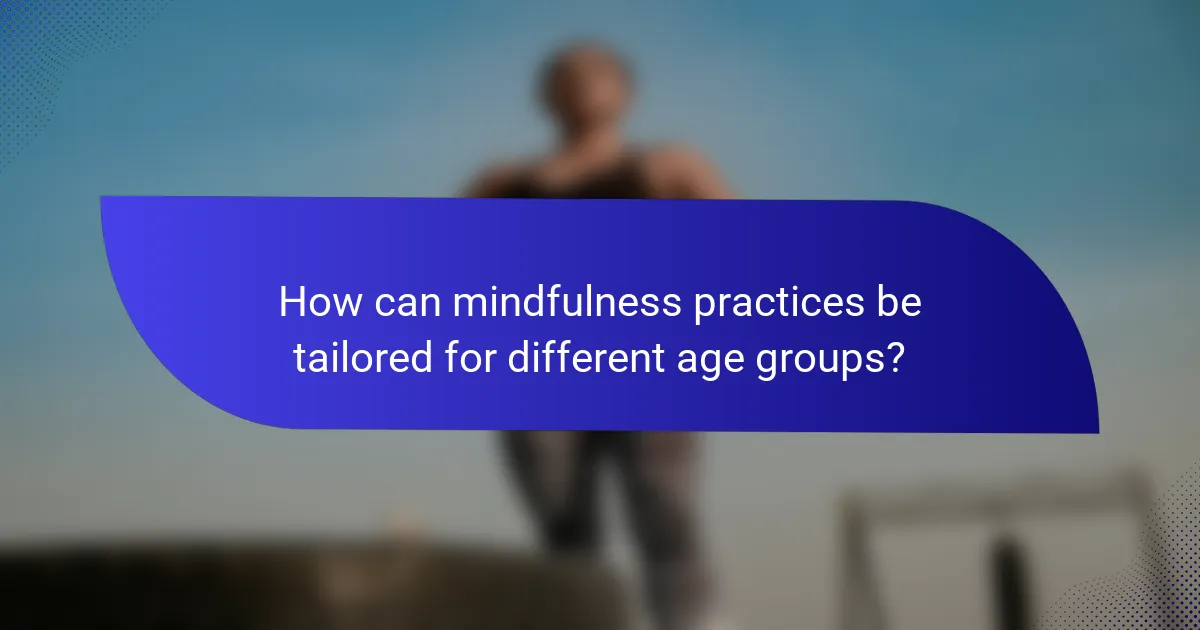
How can mindfulness practices be tailored for different age groups?
Mindfulness practices can be effectively tailored for different age groups by adjusting techniques to suit their developmental needs. For children, playful methods like guided imagery and breathing exercises enhance focus and reduce stress. Teenagers benefit from apps and group discussions that promote self-awareness and emotional regulation. Adults may prefer structured mindfulness programs, such as mindfulness-based stress reduction, to manage work-related stress. Seniors can engage in gentle practices like walking meditation and yoga to improve focus and promote relaxation. Each age group requires specific adaptations to maximize the benefits of mindfulness.
What adaptations are necessary for children and adolescents?
Children and adolescents need tailored adaptations for mindfulness practices to enhance focus and reduce stress effectively. These adaptations include age-appropriate techniques, such as shorter meditation sessions, engaging activities like mindful breathing exercises, and incorporating movement to maintain interest.
Additionally, using relatable language and examples helps connect mindfulness concepts to their daily experiences. Creating a supportive environment encourages participation and fosters a sense of safety. Regular practice and gradual progression in complexity can also enhance engagement and benefits.
How can seniors benefit from mindfulness practices?
Seniors can significantly benefit from mindfulness practices by enhancing focus and reducing stress. These practices promote mental clarity, emotional regulation, and overall well-being. Research shows that mindfulness can lower anxiety levels by up to 30% in older adults. Regular engagement in mindfulness exercises, such as meditation or deep breathing, improves cognitive function and memory retention. Additionally, mindfulness fosters a sense of community and belonging, which is crucial for emotional health in seniors.
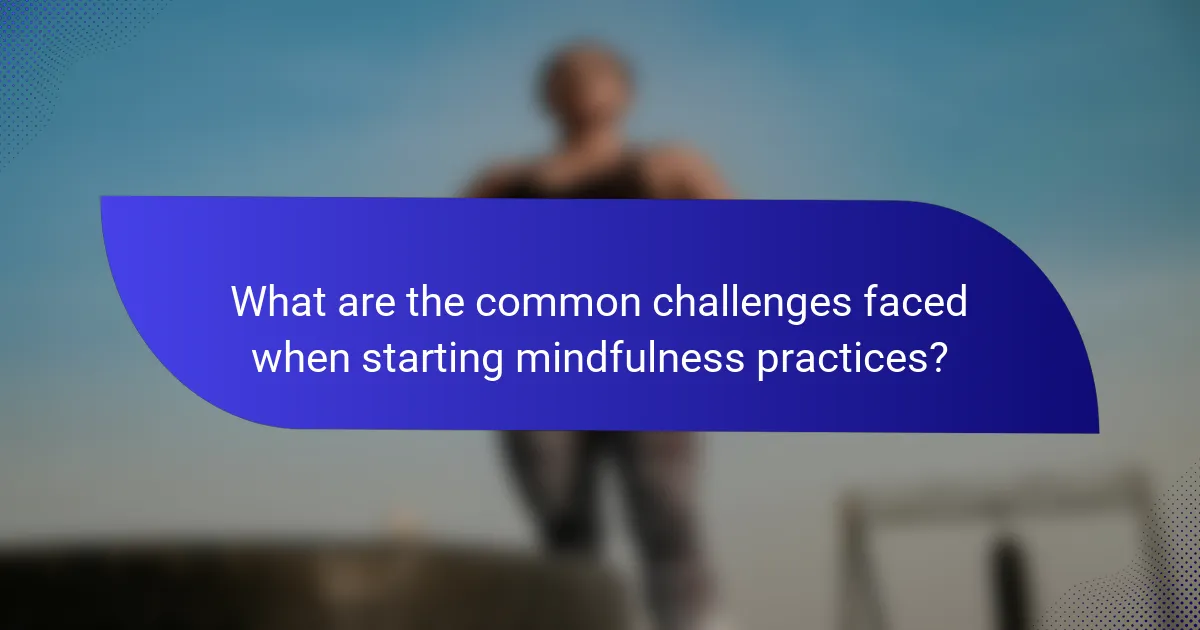
What are the common challenges faced when starting mindfulness practices?
Starting mindfulness practices often presents challenges such as difficulty concentrating, managing distractions, and maintaining consistency. Many beginners struggle with unrealistic expectations, feeling frustrated when immediate results are not evident. Additionally, integrating mindfulness into daily routines can be challenging due to time constraints. Overcoming these obstacles requires patience, commitment, and a supportive environment.
How can individuals overcome resistance to mindfulness?
Individuals can overcome resistance to mindfulness by establishing a consistent practice and focusing on immediate benefits. Start with short sessions to build comfort. Gradually increase duration to enhance focus and reduce stress. Engaging in guided meditations can provide structure and support. Incorporating mindfulness into daily activities, such as eating or walking, makes it more accessible. Tracking progress can motivate continued practice, reinforcing positive outcomes.
What misconceptions about mindfulness hinder practice adoption?
Misconceptions about mindfulness often create barriers to practice adoption. Many believe mindfulness requires extensive time commitment, but even short sessions can be effective. Others think mindfulness is only about relaxation, overlooking its role in enhancing focus and cognitive clarity. Some individuals associate mindfulness with a specific religious practice, which may deter those seeking a secular approach. Additionally, the idea that mindfulness is a quick fix for stress can lead to disappointment, as consistent practice yields the best results. Understanding these misconceptions can encourage more people to embrace mindfulness for its true benefits.
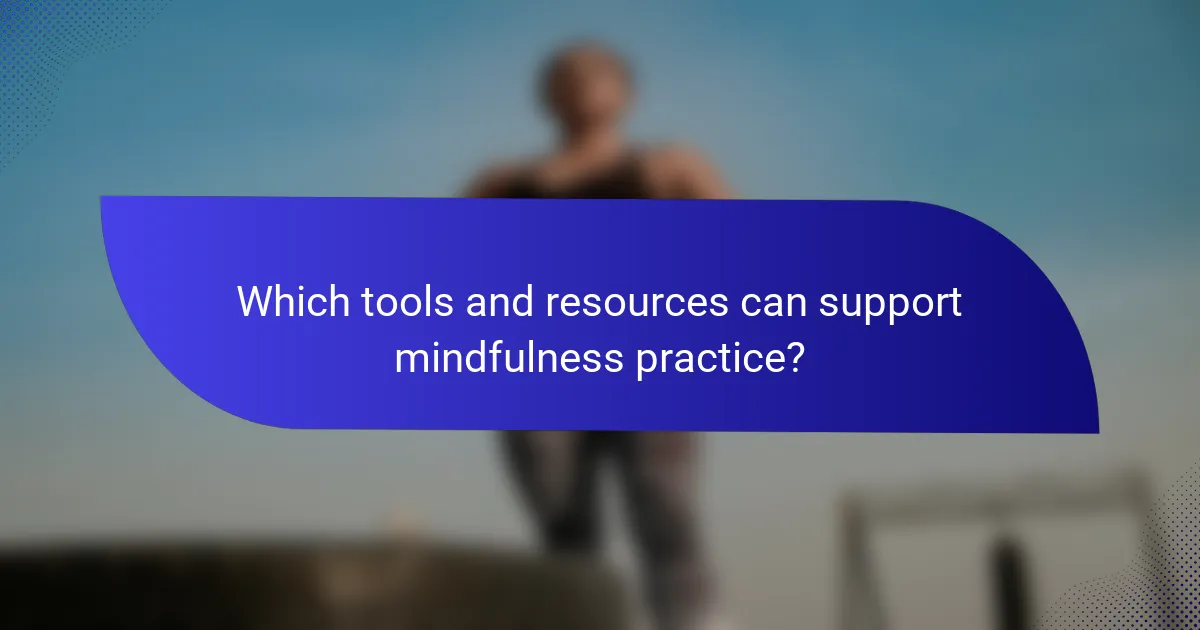
Which tools and resources can support mindfulness practice?
Mindfulness practices can be supported by various tools and resources. Apps like Headspace and Calm provide guided meditations, while books such as “The Miracle of Mindfulness” offer insights and techniques. Online courses from platforms like Coursera enhance understanding. Additionally, local workshops and community groups foster a supportive environment. Finally, mindfulness journals can track progress and reflect on experiences.
What apps and online platforms are recommended for mindfulness training?
Popular apps and online platforms for mindfulness training include Headspace, Calm, Insight Timer, and 10% Happier. These resources offer guided meditations, courses, and tools to enhance focus and reduce stress.
Headspace provides a structured program for beginners and advanced users alike. Calm focuses on sleep and relaxation techniques, while Insight Timer offers a vast library of free meditations. 10% Happier emphasizes mindfulness in everyday life with practical advice and interviews. Each platform caters to different preferences and needs, making them valuable for anyone seeking mindfulness practices.
How can community support enhance mindfulness experiences?
Community support significantly enhances mindfulness experiences by providing shared accountability and encouragement. Engaging with others fosters a sense of belonging, which can improve focus and reduce stress. Group practices, such as meditation sessions or mindfulness workshops, create a supportive environment that amplifies individual efforts. Research shows that social connections can enhance emotional resilience, making mindfulness practices more effective. Additionally, sharing experiences and insights within a community can deepen understanding and commitment to mindfulness, leading to lasting benefits.
What expert tips can improve mindfulness practice effectiveness?
To improve mindfulness practice effectiveness, incorporate structured techniques and consistent routines. Start with daily practice, even if brief, to build a habit. Use guided meditations to enhance focus and deepen experience. Set specific intentions before each session to clarify goals. Engage in mindful breathing exercises to anchor attention. Reflect on progress regularly to maintain motivation.